Rob McCann and Jared Dinsmore are sitting by a smoldering fire outside a hunting cabin in rural Maine. The air is cold, and the fire pit is framed by ferns and towering pines. Inside, there are antlers on the wall with pencil marks that date back to 1986. After the war and after the trail, this is where they are the most at ease, the most themselves.
“Jared’s been my best friend since we were born,” Rob says. “We lived right across the street from each other. We’re really better brothers than anything else.”
They had gone to boarding school in New Brunswick together, and they were both at Acadia University before Rob dropped out to enlist in the Marine Corps. Rob felt it was “the right thing at the right time,” but Jared couldn’t understand his friend’s decision.
“We had some heated talks,” Rob says.
“We had some discussions,” Jared says. “But that was Rob’s journey to take.”
When Rob left for training at Parris Island, Jared came by to see him off. “I was standing in his driveway,” he says. “His sister was going out of her mind. His mom was in the house, needed a minute. I said I guess I’ll get out of here too. It was a rough few days.”
Rob went on three deployments between 2010 and 2013, and his battalion was involved in the biggest joint operation in the war in Afghanistan—the clearing of the Taliban-held city of Marjah—during which five of his friends were killed in action. He wears black bracelets with their names inscribed.
“In hindsight,” Rob says, “I wouldn’t change anything the way it was, but I don’t think I really understood what it’s actually like to fight in a war and how that affects you for the rest of your life.”
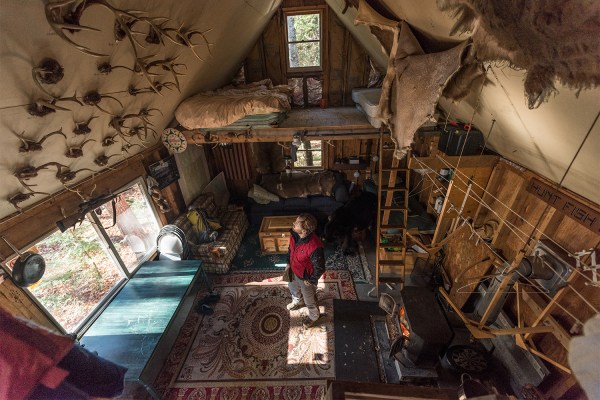
Rob McCann at the hunting cabin owned by family friends in rural Maine. He has been coming here for a decade.
The cabin is only a few miles from the Appalachian Trail, which stretches through the white pine forests and mossy bogs of Maine’s wilderness all the way to Georgia. The longest hiking-only footpath in the world, the A.T. traverses 14 states and 2,190 miles. When Rob came home and got out of the Marines, he needed a new challenge and a change of scene, so he and Jared decided to hike the whole stretch, starting from the south and ending at home in Maine. It took them six months.
“I just wanted to get away for a long period of time,” Rob says. “But when I reflect on it now, I see how powerful that experience was. I mean, you walk 2,190 miles, you’ve got a long time to process everything in your head.”
Rob had organized the hike as a fundraiser for the memorial fund of his friend Kyle Coutu, whose name is on one of Rob’s black bracelets. Kyle’s family started a nonprofit to give scholarships in his name and keep his memory alive, and Rob wanted to be part of that. The two friends had met at Parris Island and then went on their first deployment together. “He was full of life, and fun,” Rob says. “He was just someone I grew close with quickly. Part of him made me feel I was at home.”
Kyle Coutu passed away on Feb. 18, 2010, during the battle of Marjah. He and Rob were in different platoons within the same battalion. “I saw Kyle the morning before he was killed,” Rob says. “We stuck matches in a Clif Bar because the day before was his birthday. And we all shook hands, high fived, laughed at each other, walked off in different directions.”
By Rob’s account, his battalion had dropped from helicopters 40 miles outside the city, and made their way closer on foot. After 10 days of walking through the desert, getting hit by mortar shells and sleeping in holes they dug each night, they reached the city in the dark, early hours of Feb. 13. At first it was eerily quiet, but the long battle to reclaim the city began within an hour. “As soon as the sun came up, all hell broke loose for about 86 days straight,” Rob says.
Rob explains that the platoons were rotating, trying to gain ground, and five days into the operation, Kyle’s platoon moved out to try to push their limits harder. “They got lit up, real bad,” Rob says. “We couldn’t see them maneuvering, but the bullets that were being shot at them were ricocheting over our heads.”
One of those bullets hit Kyle and killed him instantly. “And I never saw him,” Rob says. “I’ve never seen him since we shook hands and went separate ways. I saw the helicopter. But I never saw him. The helicopter took off, and my parents were at his funeral a week later.”
Rob never really had time to process his friend’s death. “When someone gets hurt or killed, the helicopter comes and takes them away, and you pick up your bag and keep walking,” he says. “It doesn’t relieve you from the situation. There’s no pause button. You’re there.”
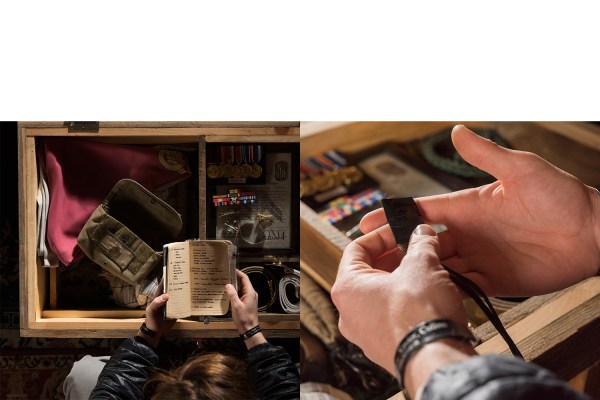
Left, Rob holds his journal from the war. Right, he holds his dog tags, which are wrapped in electrical tape to mute their rattling sound. He keeps his mementos in a wooden chest.
Rob visited Kyle’s family in Pawtucket, Rhode Island, after he got home, and he felt the magnitude of their loss. Kyle had been an only child, engaged to his high school girlfriend. The captain of the wrestling and football teams, he had graduated less than a year before he was killed, and the whole town was grieving. “You could tell by the reaction that came out of his community that he was a good kid with a big heart that obviously touched a lot of lives,” Rob says.
When he and Jared started talking about hiking the A.T., Rob knew it would be the right thing to honor his friend’s memory. The unintentional benefit was that backpacking in the wilderness for six months also helped him process his own experience. “I think it was important that I didn’t go there to reflect,” he says. “It turned into that.”
Out on the trail, Jared watched his best friend transform back to his old self, a little more each day. “Everything behind you is sort of muted for a minute, because you have this challenge,” he says. “Just enjoying the wilderness, accomplishing something, and being so tired that you don’t have anything to think about other than Ramen noodles and sleep, that was what helped him get level quick.”
“The simplicity of backpacking—that’s what I needed,” Rob says. “I just wanted to be present in the exact moment that I was in.”
They had a good time on their hike, and made new friends who meant so much to Rob that he had them, and the trail, tattooed on his arm. First they met Novie, “a tough kid from Nova Scotia.” Then they met best friends Hammer and Mallet, and The Dude, who “walked to the beat of a different drum.” In the long A.T. tradition of trail names, Rob was called Tallulah and Jared was Gravy. They were all, as Rob says, “thick-skinned blue-collar kids” in their 20s, and they just meshed well. “Your experience is based on the bubble of people you’re inside of,” he says. And he had a good bubble.
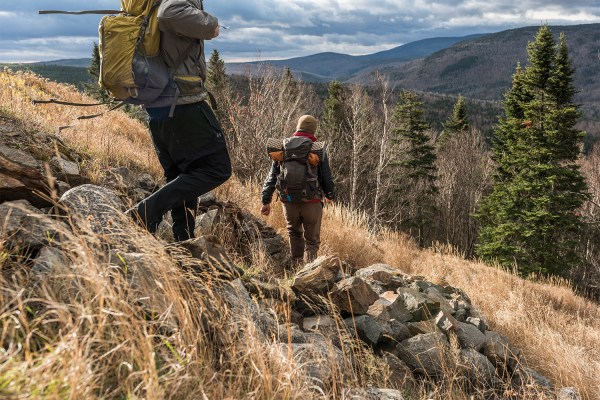
Rob and Jared hike a stretch of the Appalachian Trail in Maine. They thru-hiked the entire 2,180 miles in 2013.
Another thing the new friends had in common was that they were all unprepared for the backcountry. Rob admits he hadn’t done much research. He figured he had just come from the Infantry, and he could handle anything. On their first night in Georgia, he and Jared were so cold they thought they would freeze to death. Rob climbed into Jared’s tent for warmth, but that didn’t work because Jared “snores like a bear.” A few days in, they broke down and bought new sleeping bags with the correct temperature rating at a gear shop on Springer Mountain.
Then there was the Shenandoah River. They decided to canoe all 100 miles, even though none of them had canoed before. When they hit the first rapids three miles in, one of the canoes crashed into the rocks and filled with water. Their freshly stocked supplies slipped into the river and floated away fast. “We were unprepared to say the least,” Rob says.
Rob loved the second adolescence of being on the trail with a bunch of young guys. “Every day was funny,” he says. And there were no responsibilities, aside from making sure they had enough food and got where they were going. “You don’t have control over a lot,” he says. “Just allowing your experience to unfold is what makes it really special.”
But his favorite times were the quiet moments. In the White Mountains of New Hampshire, they’d all pile into the fire towers to watch sunsets spread like wildfire over the horizon. He was so close to home that he says he could smell Maine.
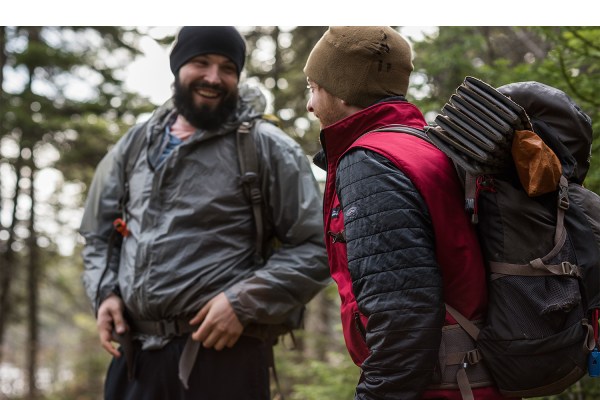
Jared (L) and Rob have been best friends since childhood. Hiking the A.T. gave them a chance to reconnect after Rob’s time in the Marines.
The Appalachian Trail ends at Mt. Katahdin, a 5,270 ft. rock in Baxter State Park. Rob, Jared and their new friends started climbing before dawn so they’d have the summit to themselves. They reached the end of their long trail at 5:30am on a misty fall morning.
“It was solemn up there,” Jared says. “We had our hoot, we had our holler. But then it was quiet for a minute.”
Rob had carried Kyle’s picture in his backpack throughout the six-month journey, and he took it out to hang on the Mt. Katahdin signpost. That’s the moment it all hit him.
“I hadn’t cried for a long time, and I let it out,” he says. “It felt good. I felt like I had done what I wanted to do. I don’t think there was a single day I hiked that I didn’t think about his friendship.”
The hike impacted Kyle’s family, too. His aunt, uncle and niece had driven out from Rhode Island to meet Rob and Jared on the trail near Bear Mountain, NY, taken them out to dinner and put them up in a hotel for a night. “We saw what it meant to them,” Jared says. “Every step was for their nephew.”
As for Jared, he hiked 2,190 miles for his own reason. “I was there for Rob’s cause,” he says, “but really, I was there for Rob.”
Rob suffers from a mild traumatic brain injury in addition to post-traumatic stress disorder. “There’s no way you can come home from those things without any sort of impact,” Rob says, but he adds that it took time on the A.T. to come to grips with that.
“I don’t even know if on the day I finished hiking, I realized how powerful the whole experience had been,” he says. “It took a lot of time to really see what it’s been able to do for me.”
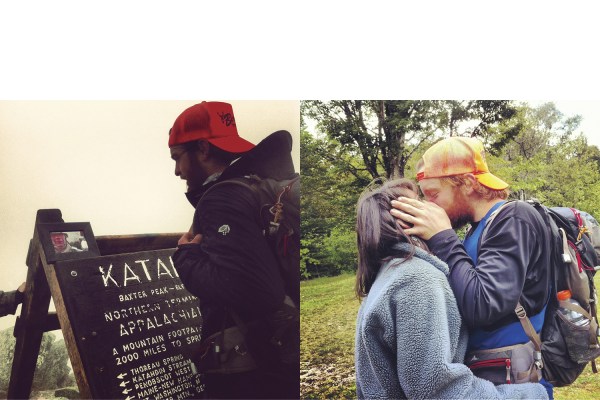
Rob’s personal photos from his hike: Left, Rob with Kyle’s photo at the summit of Mt. Katahdin. Right, Rob reuniting with Kate at the end of the trail. He proposed to her soon afterward.
After he got off the trail in September 2013, Rob proposed to his girlfriend, Kate. (They were married on Cliff Island the following year; Jared was his best man.) A month after the hike, he ran a marathon. His knees are in bad shape from carrying a 200 lb. pack for years in the Infantry, but he says hiking developed muscles in his legs that he didn’t even know he had, and that helped. “The more I try to run, the better I feel,” he says.
Hiking the A.T. pulled everything into tighter focus, and Rob came away with a clearer sense of direction. In 2015, he was selected by Maine congresswoman Chellie Pingree for a two-year paid internship as a veteran advocate. “For the first time in my life, I feel like I know what I’m supposed to be doing,” he says.
Rob says that the current practice of keeping returning service members on base for physical and mental health evaluations before releasing them is well-intentioned, but ineffective as a long-term solution. “You get a returning service member who wants to go home and see his family, you think he’s going to tell the clinician that he feels like his head really hurts?”
“Giving a clean bill of health when you know you don’t have one is your way home,” Jared adds.
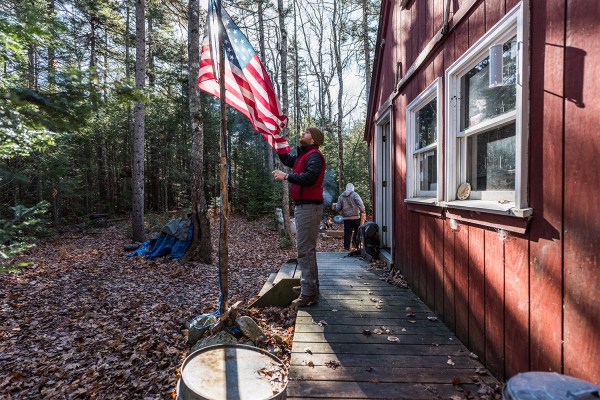
Rob at the hunting cabin in Maine, a few miles from the A.T.
“The real problem is, and this is the truth of it, when you’re surrounded by guys who have been through what you have, you feel pretty normal,” Rob says. He’s seen that stability shift when they leave base and return to their hometowns. He wants to create better veteran reintegration programs that help returning service members adjust long after they’ve come home. “I feel like for the first time I’m in a position where I have a small chance of creating real change,” he says.
Rob thinks the vets who have the hardest time with reintegration are still carrying what he calls a “combat mentality.” They’re trained to separate their emotions from the job they have to do. But there has to be something—like hiking the Appalachian Trail—that resets their thinking, and transforms soldiers back into civilians. “It’s about learning how to switch that light off,” he says. “I can’t tell you what works for everybody, but this worked for me.”
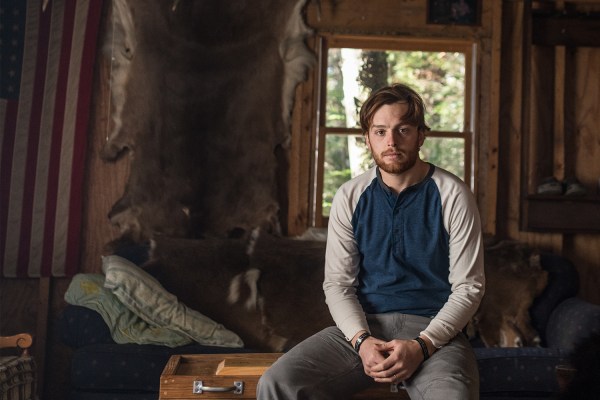
Learn more at REI.com/trails.
